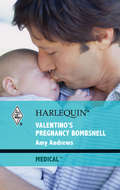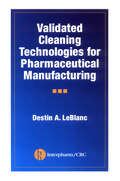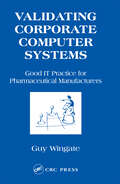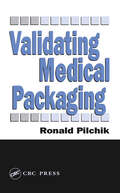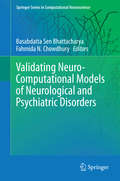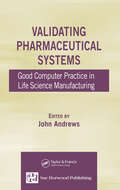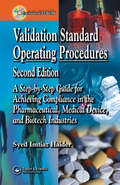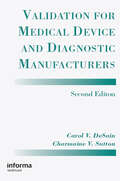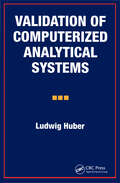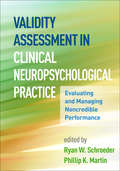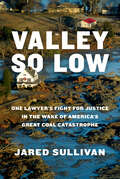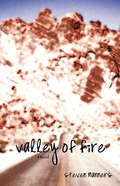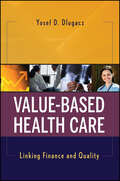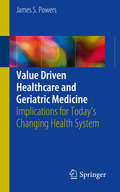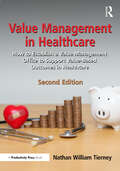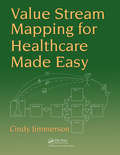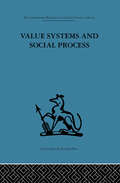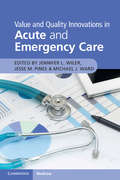- Table View
- List View
Valentino's Pregnancy Bombshell
by Amy AndrewsOne danceWhen Paige buttons up her silk bridesmaid dress she feels beautiful for the first time in years-giving her the courage to take deliciously dangerous Valentino Lombardi's hand on the dance floor.One kissPaige spends one incredible night with Valentino. Until the cold light of dawn reminds her she's a single mom with a daughter who really needs her care. As the sun rises she creeps away.One baby!Then Valentino arrives as the new surgeon at her hospital, with his playboy reputation in tow! But the bombshells don't stop there-now Paige must tell Valentino she's expecting his baby....
Validated Cleaning Technologies for Pharmaceutical Manufacturing
by Destin A. LeBlancWritten by an expert for those who must design validatable cleaning processes and then validate those processes, this book discusses interdependent topics from various technical areas and disciplines. It shows how each piece of the cleaning process fits into the validation program, making it more defensible in both internal quality audits and exter
Validating Corporate Computer Systems: Good IT Practice for Pharmaceutical Manufacturers
by Guy WingateOne of the biggest computer validation challenges facing pharmaceutical manufacturers is the large corporate system. This book provides practical information and advice on good IT practice and validation principles. Written by experts, it includes case studies on EDMSs, EAM systems, LIMSs, and MRP II systems.
Validating Medical Packaging
by Ronald PilchikAccording to the FDA Quality System Regulations, manufacturers must ensure that "device packaging and shipping containers are designed and constructed to protect the device from alteration or damage during the customary conditions of processing, storage, handling, and distribution." As specific as this statement is, the FDA does not provide instruc
Validating Neuro-Computational Models of Neurological and Psychiatric Disorders
by Basabdatta Sen Bhattacharya Fahmida N. ChowdhuryThis book is a collection of articles by leading researchers working at the cutting edge of neuro-computational modelling of neurological and psychiatric disorders. Each article contains model validation techniques used in the context of the specific problem being studied. Validation is essential for neuro-inspired computational models to become useful tools in the understanding and treatment of disease conditions. Currently, the immense diversity in neuro-computational modelling approaches for investigating brain diseases has created the need for a structured and coordinated approach to benchmark and standardise validation methods and techniques in this field of research. This book serves as a step towards a systematic approach to validation of neuro-computational models used for studying brain diseases and should be useful for all neuro-computational modellers.
Validating Pharmaceutical Systems: Good Computer Practice in Life Science Manufacturing
by John AndrewsAll too often, the words "computer validation" strike terror into the hearts of those new to the process and may even cause those familiar with it to tremble. Validating Pharmaceutical Systems: Good Computer Practice in Life Science Manufacturing delineates GCP, GLP, and GMP regulatory requirements and provides guidance from seasoned practitioners
Validation Standard Operating Procedures: A Step by Step Guide for Achieving Compliance in the Pharmaceutical, Medical Device, and Biotech Industries
by Syed Imtiaz HaiderSpanning every critical element of validation for any pharmaceutical, diagnostic, medical device or equipment, and biotech product, this Second Edition guides readers through each step in the correct execution of validating processes required for non-aseptic and aseptic pharmaceutical production. With 14 exclusive environmental performance evaluati
Validation and Qualification in Analytical Laboratories
by Ludwig HuberThis Second Edition discusses ways to improve pharmaceutical product quality while achieving compliance with global regulatory standards. With comprehensive step-by-step instructions, practical recommendations, standard operating procedures (SOPs), checklists, templates, and graphics for easy incorporation in a laboratory. This title
Validation for Medical Device and Diagnostic Manufacturers
by Carol V. Desain Charmaine V. SuttonImplementation of FDA's Design Control requirements (21 CFR 820.30) changed an entire industry. Quality System Requirements defined the approach to medical device validation. Product design, manufacturing process, and test method validation studies must be performed before or as a product is transferred to commercial production. Validation studies
Validation of Alternative Methods for Toxicity Testing
by Chantra Eskes Maurice WhelanThis book provides information on best practices and new thinking regarding the validation of alternative methods for toxicity testing. It covers the validation of experimental and computational methods and integrated approaches to testing and assessment. Validation strategies are discussed for methods employing the latest technologies such as tissue-on-a-chip systems, stem cells and transcriptomics, and for methods derived from pathway-based concepts in toxicology. Validation of Alternative Methods for Toxicity Testing is divided into two sections, in the first, practical insights are given on the state-of-the-art and on approaches that have resulted in successfully validated and accepted alternative methods. The second section focuses on the evolution of validation principles and practice that are necessary to ensure fit-for-purpose validation that has the greatest impact on international regulatory acceptance of alternative methods. In this context validation needs to keep pace with the considerable scientific advancements being made in toxicology, the availability of sophisticated tools and techniques that can be applied in a variety of ways, and the increasing societal and regulatory demands for better safety assessment. This book will be a useful resource for scientists in the field of toxicology, both from industry and academia, developing new test methods, strategies or techniques, as well as Governmental and regulatory authorities interested in understanding the principles and practicalities of validation of alternative methods for toxicity testing.
Validation of Bioanalytical Methods (essentials)
by Patric U. Vogelthis book, the validation of bioanalytical methods is described. In the quality control of biological medicinal products, bioanalytical methods are frequently used to check important properties such as the content or possible impurities. The methods used must provide trustworthy results so that no false conclusions are drawn when evaluating the results. The trustworthiness is ensured by validation. The validation of bioanalytical methods is illustrated by means of some examples.
Validation of Computerized Analytical Systems
by Ludwig HuberValidation of Computerized Analytical and Networked Systems provides the definitive rationales, logic, and methodology for validation of computerized analytical systems. Whether you are involved with formulation or analytical development laboratories, chemical or microbiological quality control laboratories, LIMS installations, or any aspect of robotic in a healthcare laboratory, this book furnishes complete validation details.International and FDA regulations and requirements are discussed and juxtaposed with numerous practical examples that show you how to cost-effectively and efficiently accomplish validation acceptable to FDA GCP/GLP/GMP, NAMAS, and EN45001 standards. The templates included provide documentation examples and the many checklists found throughout the book assure that all aspects of covered in a logical sequence. The chapters describe and explain such topics as the Product Life Cycle revalidation, change control, documentation requirements, qualifications, testing, data validation and traceability, inspection, SOPs, and many other that help streamline the validation process.
Validierung (essentials)
by Patric U. VogelIn diesem Buch wird die Validierung analytischer Methoden beschrieben. Bei der Qualitätskontrolle von biologischen Arzneimitteln kommen häufig biologisch-analytische Methoden zum Einsatz, um wichtige Eigenschaften wie den Gehalt oder mögliche Verunreinigungen zu überprüfen. Die eingesetzten Methoden müssen vertrauenswürdige Ergebnisse liefern, damit bei der Bewertung der Ergebnisse keine falschen Schlüsse gezogen werden. Die Vertrauenswürdigkeit wird durch eine Validierung sichergestellt. Die Validierung von analytischen Methoden wird anhand einiger Beispiele dargestellt. Die geänderten Vorgaben ab Juni 2024 sind berücksichtigt.
Validierung bioanalytischer Methoden (essentials)
by Patric U. VogelIn diesem Buch wird die Validierung bioanalytischer Methoden beschrieben. Bei der Qualitätskontrolle von biologischen Arzneimitteln kommen häufig bioanalytische Methoden zum Einsatz, um wichtige Eigenschaften wie den Gehalt oder mögliche Verunreinigungen zu überprüfen. Die eingesetzten Methoden müssen vertrauenswürdige Ergebnisse liefern, damit bei der Bewertung der Ergebnisse keine falschen Schlüsse gezogen werden. Die Vertrauenswürdigkeit wird durch eine Validierung sichergestellt. Die Validierung von bioanalytischen Methoden wird anhand einiger Beispiele dargestellt.
Validity Assessment in Clinical Neuropsychological Practice: Evaluating and Managing Noncredible Performance (Evidence-Based Practice in Neuropsychology)
by Ryan W. Schroeder and Phillip K. MartinPractical and comprehensive, this is the first book to focus on noncredible performance in clinical contexts. Experts in the field discuss the varied causes of invalidity, describe how to efficiently incorporate validity tests into clinical evaluations, and provide direction on how to proceed when noncredible responding is detected. Thoughtful, ethical guidance is given for offering patient feedback and writing effective reports. Population-specific chapters cover validity assessment with military personnel; children; and individuals with dementia, psychiatric disorders, mild traumatic brain injury, academic disability, and other concerns. The concluding chapter describes how to appropriately engage in legal proceedings if a clinical case becomes forensic. Case examples and sample reports enhance the book's utility.
Valley So Low: One Lawyer's Fight for Justice in the Wake of America's Great Coal Catastrophe
by Jared SullivanWINNER OF THE TENNESSEE BOOK AWARD FOR NONFICTION • A NEW YORKER BEST BOOK OF THE YEAR • A riveting courtroom drama about the victims of one of the largest environmental disasters in U.S. history—and the country lawyer determined to challenge the notion that, in America, justice can be bought &“[A] tense investigative chronicle.&” —The New YorkerFor more than fifty years, a power plant in the small town of Kingston, Tennessee, burned fourteen thousand tons of coal a day, gradually creating a mountain of ashen waste sixty feet high and covering eighty-four acres, contained only by an earthen embankment. In 2008, just before Christmas, that embankment broke, unleashing a lethal wave of coal sludge that covered three hundred acres, damaged nearly thirty homes, and precipitating a cleanup effort that would cost more than a billion dollars—and the lives of more than fifty cleanup workers who inhaled the toxins it released.Jim Scott, a local personal-injury lawyer, agreed to represent the workers after they began to fall ill. That meant doing legal battle against the Tennessee Valley Authority, a colossal, federally owned power company that had once been a famous cornerstone of President Franklin D. Roosevelt&’s New Deal. Scott and his hastily assembled team gathered extensive evidence of malfeasance: threats against workers; retaliatory firings; disregarded safety precautions; and test results, either hidden or altered, that would have revealed harmful concentrations of arsenic, lead, and radioactive materials at the cleanup site. At every stage, Scott—outmanned and nearly broke—had to overcome legal hurdles constructed by TVA and the firm it hired to help execute the cleanup. He grew especially close to one of the victims, whose swift decline only intensified his hunger for justice. As the incriminating evidence mounted, the workers seemed to have everything on their side, including the truth—and yet, was it all enough to prevail?The lawsuit that Scott pursued on the workers&’ behalf was about their illnesses, no doubt. But it was also about whether blue-collar employees could beat the C-suite; if self-described &“hillbilly lawyers&” could beat elite corporate defense attorneys; and whether strong evidence could beat fat pocketbooks. With suspense and rich detail, Jared Sullivan&’s thrilling account lays bare the casual brutality of the American justice system, and calls into question whether—and how—the federal government has failed its people.
Valley of Fire
by Steven MannersJohn Munin is a rational man, a gifted Montreal psychiatrist who believes that the soul and psyche are interesting only in dissection. Even relationships are ripe for analysis, and Munin has identified "six elements that are necessary for love." His wife, Cynthia, an aspiring artist who paints only self-portraits, remains unconvinced taht love can be so quantified. More susceptible to Munin’s seraching analysis, though, is Penelope, who suffers from obsessive-compulsive disorder and is Munin’s star patient.Munin plans to present Penelope’s case at a major medical conference in Nevada. But something has happened to the probing psychiatrist recently, and in the aftermath his orderly world crumbles in the crucible of the desert.Set against the bizarre backdrop of Las Vegas where fate can change unalterably with the turn of a card, Munin is forced to question all of the truths he has held dear. Do events happen due to careful planning or is life just a game of chance? If God played diece with the universe, would he win?
Valorization of Agro-Industrial Byproducts: Sustainable Approaches for Industrial Transformation
by Anil Kumar Anal and Parmjit S. PanesarThis book covers sustainable approaches for industrial transformation pertaining to valorization of agro-industrial byproducts. Divided into four sections, it starts with information about the agro/food industry and its byproducts, including their characterization, followed by different green technologies (principle, process strategies and extraction of bioactive compounds) applied for the management of agro industry byproducts. It further explains biotechnological interventions involved in the value addition of these byproducts. Various regulatory and environmental concerns related to by-product management along with biorefinery concept and future strategies are provided as well. Features: Provides extensive coverage of agro-industrial by products and their environmental impact. Details production of value-added products from agro-industrial waste. Describes environmental legislations and future strategies. Presents multidisciplinary approaches from fundamental to applied and addresses the biorefinery and circular economy. Includes innovative approaches and future strategies for management of agro-industrial waste. This book is aimed at researchers, graduate students and professionals in food science/food engineering, bioprocessing/biofuels/bioproducts/biochemicals and agriculture, bioeconomy, food waste processing, post-harvest processing, and waste management.
Valorization of Biomass Wastes for Environmental Sustainability: Green Practices for the Rural Circular Economy
by Mukesh Kumar Arun Lal Srivastav Abhishek Kumar BhardwajThis volume discusses the reduction, recycling, and reuse of industrial and agricultural biomass wastes to develop value-added products using environmentally sustainable practices and technologies. Through these waste valorization approaches, biomass waste materials can be converted into useful bio-chemical products, sustainable construction materials, polymers, bio-energy, and bio-fuel as sustainable alternatives to products and materials with negative environmental and health consequences. The chapters highlight the development and implementation of eco-friendly solutions to biomass waste production with the aim of reducing natural resource deterioration, bolstering rural and small-scale business systems in communities impacted by pollution and climate change, and providing power from residual biomass to broadly reduce environmental impacts through improved waste management practices. The book is intended to be a useful resource for researchers, policymakers, NGOs, government agencies, and local community authorities working in waste management and environmental sustainability.
Value Based Health Care
by Dlugacz Yosef D.Value-Based Health Care Linking Finance and Quality Yosef D. Dlugacz Value-Based Health Care? Value-Based Health Care?concisely explains the mandate to successfully link health care quality and finance and describes the tools to implement strategies for organizational success. Yosef Dlugacz provides many illustrative real-world examples of process and outcomes of the value-based approach, taken from a wide range of health care settings. Perfect for students preparing to enter health care management or for practicing health care leaders and professionals, this book is a vital guide to approaches that ensure the health of patients and health care organizations alike. Praise for Value-Based Health Care "Value-Based Health Care provides leaders and quality experts with the much needed roadmap for linking cost and quality. This book will help your organization thrive in today's ultra-competitive environment. " -Patrice L. Spath, health care quality specialist and author of Leading Your Health Care Organization to Excellence and Error Reduction in Health Care: A Systems Approach to Improving Patient Safety "Yosef Dlugacz provides an essential overview of how staff, administrators, and clinicians can create not just a culture but a gestalt of quality health care delivery. . . . given the national debate over access, cost, and quality, the book could not be more timely. " -Theodore J. Joyce, PhD, professor of economics and finance, academic director of the Baruch/Mt. Sinai MBA Program in Health Care Administration, and research associate, National Bureau of Economic Research "Dr. Dlugacz's?case studies and action plans provide great insights and workable solutions to provide safe and effective patient care. It is a welcome resource as we sit on the?advent of health reform. " -Kathy Ciccone, executive director, Quality Institute of the Healthcare Association of New York State
Value Driven Healthcare and Geriatric Medicine: Implications for Today's Changing Health System
by James S. PowersValue driven healthcare is the lasting legacy of the Affordable Care Act, which had three goals: to improve access to healthcare by increasing healthcare insurance coverage, to improve the patient’s experience and quality of care, and to slow the rate of increase in healthcare costs. Regardless of changes to the financing of healthcare or changes in policy, value-based purchasing for healthcare is to remain a constant feature of the healthcare horizon. Value-based purchasing is a demand side strategy to reward quality in health care delivery. Value-based purchasing involves cost considerations and includes the actions of employers, the public sector, health plans, and individual consumers in making healthcare decisions. Effective health care services and high performing health care providers are incentivized to provide quality outcomes and to control cost. Value-based purchasing drives quality metrics which are publicly reported and serve as important levers for changes in healthcare delivery. Geriatric patients consume a disproportionate share of healthcare resources, so CMS directs Medicare and drives geriatric healthcare models. All other insurers generally model CMS/Medicare guidelines. Innovative geriatric care models which demonstrate improved outcomes and cost moderation are scaled and lessons learned used to create new healthcare models. The best data for broader value driven healthcare comes from the geriatric models, which currently have the best data available. This book traces the origins of value-based purchasing and current geriatric care models and synthesizes their implications for today's changing health system. It also discusses healthcare accountability and risk sharing. The audience includes geriatric healthcare professionals, but also a wider audience interested in broader healthcare models and value driven healthcare from a policy, economic, and ethical perspective. These include primary care physicians, specialists who work with aging patients, hospital administrators, healthcare educators, healthcare organizations, and all medical professionals working with aging patients and patients affected by healthcare reform.
Value Management in Healthcare: How to Establish a Value Management Office to Support Value-Based Outcomes in Healthcare
by Nathan William TierneyOur current healthcare system is broken. The Organisation for Economic Co-operation and Development (OECD) predicts healthcare costs could increase from 6% to 14% of GDP by 2060. The cause of this increase is due to (1) a global aging population, (2) growing affluence, (3) rise in chronic diseases, and (4) better-informed patients, all of which raises the demand for healthcare. In 2006, Michael Porter and Elizabeth Teisberg authored the book Redefining Health Care: Creating Value-Based Competition on Results. In it, they present their analysis of the root causes plaguing the healthcare industry and make the case for why providers, suppliers, consumers, and employers should move toward a patient-centric approach that optimizes value for patients. According to Porter, "value for patients should be the overarching principle for our broken system." Given the current state of global healthcare, there is urgency to achieve widespread adoption of this new approach. The updated second edition of this book discusses two major issues driving the importance of value-based care. The first is the emergence of artificial intelligence, which has the potential to significantly impact and enhance value-based healthcare in several ways such as delivering personalized medicine, predictive analytics for patient outcomes, and improving population health management. The second issue is why value-based care continues to struggle in scaling. While value-based healthcare has shown promise in improving patient outcomes and controlling costs, there have been challenges in implementation such as transitioning from the traditional fee-for-service model, data interoperability issues, and limited standardization of health outcomes. These challenges do not necessarily mean that value-based healthcare has failed. Instead, they highlight the complexities of the work involved and the need to follow a process as provided in this book. The intent of this book is to equip all healthcare delivery organizations with a guide for putting the value-based concept into practice. With updated material and case studies, this book defines the practice of value-based healthcare as value management. The book explores Mr. Porter’s value equation (Value = Costs/Outcomes), which is central to value management, and provides a step-by-step process for how to calculate the components of this equation. On the outcomes side, the book presents the value realization framework, which translates organizational mission and strategy into a comprehensive set of performance measures and contextualizes the measures for healthcare delivery.
Value Stream Mapping for Healthcare Made Easy
by Cindy JimmersonIn no industry is the concept of quality more essential than it is in healthcare, which is why the lean quality principles learned through the example of the Toyota Production System are so applicable. Two fundamental principles of Toyota‘s push for excellence are especially relevant to healthcare: ensuring quality at every step and keeping improve
Value Systems and Social Process (Pelican Ser.)
by Geoffrey VickersTavistock Press was established as a co-operative venture between the Tavistock Institute and Routledge & Kegan Paul (RKP) in the 1950s to produce a series of major contributions across the social sciences. This volume is part of a 2001 reissue of a selection of those important works which have since gone out of print, or are difficult to locate. Published by Routledge, 112 volumes in total are being brought together under the name The International Behavioural and Social Sciences Library: Classics from the Tavistock Press. Reproduced here in facsimile, this volume was originally published in 1968 and is available individually. The collection is also available in a number of themed mini-sets of between 5 and 13 volumes, or as a complete collection.
Value and Quality Innovations in Acute and Emergency Care
by Michael J. Ward Wiler Jennifer L. Pines Jesse M.Access to acute and emergency care is essential when we are ill or injured, but the costs are significant. How can we make services more efficient and effective? This thought-provoking text provides twenty case studies detailing successful innovations to enhance value, including telehealth, observation medicine, high utilizer programs, and the use of informatics to improve clinical decision support. A detailed history of system developments over the last fifty years in the US and internationally is provided, and subjects including measurement and quality improvement, volume versus value based care, and emergency department crowding are discussed. This book is an ideal way for emergency physicians and healthcare managers to explore new ideas and enhance the quality of care in their area.
